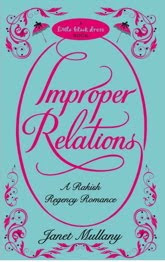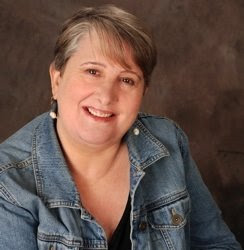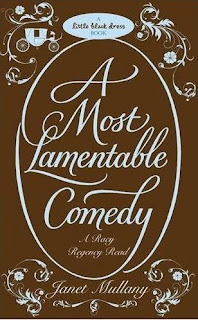 Diane here, with the absolute delight of interviewing Riskies own Janet Mullany about her Little Black Dress release, Improper Relations, released today! If you haven’t already, hurry over to Book Depository (with its free shipping) or any UK book vendor and order this book.
Diane here, with the absolute delight of interviewing Riskies own Janet Mullany about her Little Black Dress release, Improper Relations, released today! If you haven’t already, hurry over to Book Depository (with its free shipping) or any UK book vendor and order this book.
I read Improper Relations and I am absolutely in awe. I don’t think I’ve read anyone who reminded me more of Georgette Heyer, except Janet writes like Heyer after a few drinks.
But don’t just listen to me. Here’s a review of Improper Relations
What I continue to love about Janet Mullany’s books is how she manages to convincingly tell her story in first person from both her hero and her heroine’s perspective. The first person narrative gives an extremely refreshing take on the insanity which populates the plot; from the way her heroine observes the foibles of her own family, to the slowly beautiful dance it takes the hero to discover he’s in love. I can’t wait to see where she goes next–Stacey, Publisher’s Weekly, Beyond the Book.
Janet will give away a signed copy of Improper Relations to one lucky commenter chosen at random. Without further ado, here’s Janet!
Janet, what were you doing? Channeling a very naughty Georgette Heyer? Tell us about Improper Relations!I brought a conversation at a conference to a total embarrassed stop when I told a group of writers (who I’d never met before) that I really wasn’t very interested in men because relationships between women were so much more interesting and that’s what I was currently writing about! To clarify my out-of-the-closet confession, I wanted to write a romance where a friendship between two women is as central to the book as the romantic relationship itself, and loyalty, to the friend or the husband, cause the conflict that drive the plot. And I have to admit I really wanted to start a book with the sentence: My story begins with a marriage.
You did such a clever job of tying all the threads together. It made me very curious about your plotting process. Did you figure it all out ahead of time? Or did you fly by the seat of your pants?
A bit of both. I sold it on proposal, so I knew roughly what was going to happen, but I trusted to luck about how everything would tie in. There was a character, a rather horrible old lady, who appeared quite early on and she turned out be very significant later. I blogged about that at the Riskies after I’d written a scene with her in the middle of the night as an example of trusting your instincts when writing, which I really did with this book. I tend to spend a lot of time thinking about fixing to get ready etc. to write and my first drafts are usually very clean, which is just as well.
Your voice is so distinct. Were there any writers in particular who inspired your style?
I’ve read a lot, but mostly outside romance. I write romance because I think what I write fits in with the genre (which is huge, there’s room for a lot of variants and niches!) so I don’t think I ever fell into the trap of writing as though I were writing a romance (does that make sense?). I don’t analyze what I do a lot, but I’ve always been able to make people laugh. Apparently John Cleese realized that his repressed anger was the inspiration for Monty Python sketches that involved people shut up together shouting at each other (The Argument Sketch here). I tend to like getting groups of people behaving badly together, and I don’t quite know what that says about me (it was at the core of my last book, A Most Lamentable Comedy, where they were all engaged in amateur theatricals in the country). The huge resolution scene in Improper Relations has about six to ten people coming in and out of a room at an inn.
I didn’t see any special research in Improper Relations. Was there any?
Uh. No. Originally Shad, the hero, started off as a military officer, but I was reading Nelson: A Personal History, by Christopher Hibbert (wonderful historian) while I was writing it and so he became a naval man.
What is risky about Improper Relations?
I don’t think it is a particularly risky book, to be honest, other than in style and structure. It’s all very conventional stuff, but I think the risk comes in the delivery. With all my books, either readers are going to get it or they’re going to be confused–I hope more of the former than the latter! If there is an element of risk, it’s in having a heroine who allows herself to be manipulated by someone she loves–and it’s not the hero or another man, it’s her best friend. Oh, and the hero and heroine end up in bed at the end of the book and go to sleep instead of having a boinkfest. I wanted them to fade into domestic tranquillity.
I’m in awe about how you included just about every Regency cliché there is. How did you do that?
I had a sort of shopping list of things I wanted to include, as well as the first sentence! I wanted to do a marriage of convenience because I thought the sex would be interesting to write about; I also wanted a duel, a Vauxhall Garden scene, the heroine to be transformed by a makeover into a ravishing beauty, a John Thorpe, a Wickham … I make absolutely no secret of the fact that I’m writing for my own pleasure and entertainment. And, yes, there’s sex in this, but sex as practiced by uptight Georgian people in an era where men married good girls and had sex for procreation, and paid bad girls for anything else. So great sex in marriage is a delightful, if worrying, surprise.
What amazingly clever, wickedly irreverent, riotously funny book is next for you?
My next Little Black Dress book, for spring 2011, is going to be called Mr. Bishop and the Actress–it’s funny that with all three of the books for Little Black Dress the title has come first or very early in the process. And I hope it’s all of the above! I don’t know if this is generally known outside England, but if you tack on “…as the actress said to the bishop” to an innocent statement, it immediately makes it obscene. For instance, “Do you think it will snow today?” “Yes, we’re supposed to get six inches … as the actress said to the bishop.” (The same thing works with fortune cookies, if you add “in bed.”) Possibly Shad and Charlotte (hero and heroine of Improper Relations) will appear as secondary characters.
In April, I have a Loose-Id e-novella, Reader, I Married Him, a dirty version of Jane Eyre, and then in October I have Jane & the Damned from HarperCollins and my novella which may or may not be called Little to Hex Her, based on Emma, in the anthology Bespelling Jane with Mary Balogh, Susan Krinard, and Colleen Gleason.
I can’t wait!
Remember, everyone, comment for a chance to win a copy of Improper Relations. Ask Janet a question or see how many Regency conventions we can list. What are your favorites?








